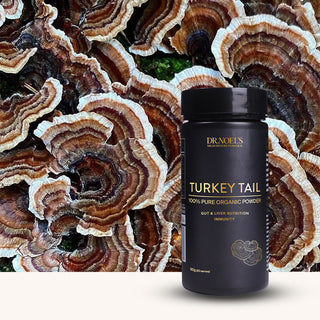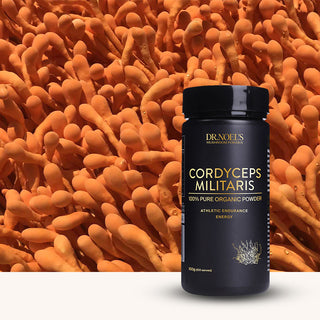The liver is one of your body’s biggest and most vital organs, frequently known as the detoxification organ. Even though it is best known as the detoxification organ because it filters blood and breaks down everything you ingest, including food, drink, and medications, the liver is thought to perform hundreds of tasks vital to human health.
Oxidative stress is believed to strain liver function and contribute to the development of problems with the liver. Liver disease is the cause of two million deaths per year or 4% of all deaths.
Lifestyle choices can help or hurt the liver’s ability to function. Your liver’s health can be impacted by the foods you eat, how active you are, how much alcohol and drugs you use, and the medications you take.
Strong antioxidant qualities found in Cordyceps, a medicinal mushroom and adaptogen, can help maintain a healthy liver. According to research, it contains several substances with potent antioxidant and health-promoting qualities.
Researchers have examined the potential benefits of compounds found in Cordyceps mushrooms for liver health. This post explores the scientific claims in depth.

Exploring Cordyceps For Liver: What The Science Says?
Numerous studies show the beneficial effects of using Cordyceps to support liver fibrosis and decrease hepatic fat accumulation. It has been demonstrated that extracts from Cordyceps lower blood sugar and hepatic enzyme levels while protecting liver cells from acute injury.
The anti-inflammatory and antioxidant qualities of Cordyceps mushrooms have been demonstrated to improve health and, in some cases, even treat nonalcoholic fatty liver disease. Below, we analyze these studies in detail.
Cordyceps may help treat NASH
Nonalcoholic fatty liver disease (NFAHLD), particularly nonalcoholic steatohepatitis (NASH), has emerged as a leading cause of liver-related mortality. The hepatic form of metabolic syndrome, known as nonalcoholic steatosis of the liver (NASH), is typified by hepatic steatosis, inflammation, hepatocellular damage, and varying degrees of fibrosis. Unfortunately, there isn’t a drug that has been approved by the US Food and Drug Administration to treat the dreaded illness. It has been suggested that therapeutic AMP-activated protein kinase (AMPK) activators could be used to treat metabolic disorders like NASH.
In a 2021 study, researchers evaluated the effects of cordycepin on fat storage in the liver, fibrosis development and inflammation in mice with NASH. Cordycepin attenuated inflammation, lipid accumulation, and lipotoxicity in liver cells subjected to metabolic stress. In addition, cordycepin treatment significantly and dose-dependently decreased the elevated liver markers in mice with NASH. Furthermore, cordycepin treatment significantly reduced inflammatory cell infiltration, hepatic triglyceride accumulation, and hepatic fibrosis in mice. In vitro and vivo studies revealed that a vital mechanism linking the protective effects of cordycepin was related to AMPK.
Cordyceps may alleviate NAFLD
NAFLD is a growing public health concern with the rise in type 2 diabetes and metabolic syndrome. Therefore, in a 2014 study, scientists investigated the protective effect of Cordyceps militaris against NAFLD in obese mice.
Four-week-old male mice were fed a diet with or without 1% Cordyceps militaris water extract for 10 weeks. Blood insulin, glucose, free fatty acid (FFA), liver enzymes (ALT), and proinflammatory cytokines proteins were measured. The levels of lipids, lipid peroxide, and glutathione (GSH) were determined in the liver.
Consumption of Cordyceps mushroom significantly decreased blood glucose levels, insulin resistance (HOMA-IR) and FFA levels in mice. In addition, the mushroom also significantly decreased total fat and triglyceride contents in the liver. Hepatic enzymes were also reduced. The Consumption of the mushroom reduced lipid peroxide and increased hepatic GSH levels. These findings suggest that Cordyceps militaris may have a preventive effect on the onset of NAFLD. This may be achieved partly by improving the hepatic anti-oxidant status and lowering inflammatory cytokines in the mice.
Cordyceps can alleviate injury in liver failure
In a 2020 study, researchers evaluated the mechanism of a polysaccharide obtained from Cordyceps in rats with acute liver failure. Sixty rats were randomly divided into five groups, with some receiving three different doses of Cordyceps polysaccharide.
Liver enzymes such as aspartate transaminase (AST), alanine aminotransferase (ALT), alkaline phosphatase (ALP), and total bilirubin were measured to assess hepatic function. Biopsies were taken to observe liver pathology.
The liver failure group showed higher levels of liver enzymes, as well as liver cell death, than the groups treated with Cordyceps mushroom polysaccharide. Researchers concluded that polysaccharides obtained from Cordyceps can alleviate inflammatory injury and the immune response in acute liver failure. This is achieved by regulating the balance of proinflammatory and anti-inflammatory factors and reducing spontaneous cell death.
Cordyceps protects against liver injuries
In an analysis from 2014, researchers found that Cordyceps sinensis protects against liver injuries in rats with chronic kidney disease. In the study, male rats were divided into groups that were treated with or without Cordyceps sinensis. After 8 weeks of treatment, metabolites were extracted from the livers of the rats and analyzed.
Energy metabolism, oxidative stress, amino acid and protein metabolism and choline metabolism were considered as links between kidney disease and extrarenal organ dysfunction. By reversing the regulation of metabolite levels commonly disrupted in chronic kidney disease, oral administration of Cordyceps sinensis demonstrated hepatic rescue effects.
In another study, cultured mycelium from Cordyceps sinensis was found to protect the liver cells in mice with acute liver injury. Thirty-nine male mice were randomly divided into four groups: some received Cordyceps mushrooms while some did not. The blood levels of liver function parameters, including ALT and AST, were assayed.
The protective effects of Cordyceps on liver sinusoidal endothelial cells were assessed with biopsies. Results demonstrated that Cordyceps militaris significantly improved liver enzymes, attenuated hepatic inflammation and improved injury in the liver.
Benefits Of Cordyceps Mushroom
Cordyceps is classified as an adaptogen, a substance thought to improve general health, athletic performance, kidney and liver function, and cognitive abilities. It also helps people adapt to and manage stress, anxiety, and fatigue. Furthermore, Cordyceps is believed to have antioxidant, immunological-stimulating, and anti-tumor qualities. It may also lower blood sugar and slow the clotting process.
Cordycepin and cordycepic acid, the active ingredients in cordyceps, are responsible for its medicinal qualities. Vitamins E, B1, B2, B12, K, carbohydrates, proteins, sterols, and nucleosides—including adenosine, a naturally occurring substance in the body with numerous vital functions—are also present in cordyceps.
According to research, cordyceps mushrooms have several significant beneficial effects on health, including the following:
1. Cordyceps boost vigor for exercise and sports
Cordyceps sinensis is a fungus that has been used for centuries in Asia. It has remarkable adaptogenic properties and can give you energy and vitality to help you deal with stressful situations both physically and mentally.
It has even earned the moniker “the mushroom recommended for sport” since, in 1993, some Chinese athletes’ performance in a national competition brought it global attention.
Furthermore, a number of scientific studies support its effects on boosting ATP synthesis and oxygen consumption, enhancing muscle strength, accelerating muscle recovery, and promoting lactic acid excretion.
2. An effective anti-aging
Apart from inducing a sense of increased energy in older individuals due to its anti-fatigue properties, Cordyceps also has the capacity to mitigate the impact of oxidative stress, which accelerates age-related symptoms and promotes the onset of illnesses.
3. Maintains blood sugar balance
There is enough scientific data to conclude that Cordyceps prevents insulin degradation and enhances pancreatic insulin secretion. In addition, it lowers the oxidative level, which is one of the primary causes of insulin resistance.
4. For the hormonal health
Asian cultures have been using Cordyceps as an aphrodisiac for centuries. Frequently employed as a potent tool to boost libido, among other benefits, it continues to draw new devotees who are eager to experience its purportedly potent effects on private lives.
Here are some more suggested uses for Cordyceps:
- Tonic and stimulant for overall health
- Enhancing renal performance
- Increasing defense against infection
- Sexual dysfunction
- Heart rhythm abnormalities, or arrhythmias
- Cold and cough
- Inhalation
- Weariness
Only high-quality cordyceps supplements contain the bioactive components of Cordyceps mushrooms, which are thought to have health benefits. Choosing a premium mushroom supplement can be challenging because many options are available. However, there are a few crucial elements to consider when selecting a high-quality mushroom supplement.
Prioritizing the quality of the ingredients is essential. Look for a supplement that contains 100% pure Cordyceps extract. Products with artificial ingredients, binders, or fillers should be avoided.
Additionally, ensure the product has undergone impartial testing for purity and efficacy to guarantee it is devoid of contaminants. To ensure that mushrooms are safe to eat, look for products that have passed safety tests for heavy metals and pesticides. Choose mushrooms from growers who have obtained USDA and EU organic certification.
The mycelium that grows on grains is primarily composed of carbohydrates and contains little beta-glucan. It has very little or no capacity to produce these secondary metabolites. Consequently, buying Cordyceps products derived from mycelial sources is similar to buying grain starch, which is essentially filler.
Another crucial factor to take into account is the supplement’s dosage. Look for a supplement with a recommended amount of Cordyceps extract. Read the label carefully, as some products may recommend different dosages. It’s essential to consider the quantity of servings per container and how frequently to dose.
Cordyceps supplements come in various forms, including powders, capsules, and teas. Each kind has advantages and disadvantages. Although powders can be mixed into shakes or other beverages, capsules are easier to swallow. Teas are a great option if you’d rather have something warm to drink.
Lastly, consider the reputation of the brand. Select a manufacturer that has a proven track record of creating high-quality supplements. Read their reviews to learn more about other people’s opinions of the product.
FAQs About Cordyceps For Liver
What Should Be Considered While Taking Cordyceps For Liver Support?
Although Cordyceps mushrooms have some promising benefits for liver health, it’s essential to use caution when using them. Before including them in your wellness routine, it is advisable to speak with a healthcare provider, mainly if you are pregnant, taking medication, or have pre-existing health conditions. Common side effects that some Cordyceps users may encounter include nausea, upset stomach, dry mouth, and diarrhea.
How Quickly Does Cordyceps Work For Liver Support?
Generally, Cordyceps mushrooms are taken as tonics consistently to support the liver and other systems and organs. While benefits may take longer to manifest over two to three months, they may do so in as little as one to two weeks.
What Is The Best Way To Take Cordyceps Mushroom For Liver Support Benefits?
While drinking tea can be relaxing and beneficial, taking Cordyceps mushrooms as a supplement in the form of capsules is the most powerful and efficient way to obtain a high-potency dose. Consult a healthcare provider before taking Cordyceps to ensure appropriate dosage and supplement.
How Much Cordyceps Should I Take For Liver Benefits?
Determining the correct dosage for Cordyceps mushrooms is vital if you want to reap the full health benefits. The correct dosage may vary depending on the form of Cordyceps, any underlying medical conditions, and overall health. Nonetheless, taking 1 to 2 grams daily is a great place to start.
What Are Other Natural Ways To Support Liver Health?
Liver health is greatly influenced by the daily decisions you make regarding your diet, exercise routine, and use of drugs and alcohol. Consume a diet rich in fruits, vegetables, whole grains, lean proteins, and healthy fats. Drink in moderation or not at all, and get regular exercise. You may try lowering the dosage of drugs that damage your liver upon your physician’s recommendation.
Conclusion
Including Cordyceps in your daily routine, in addition to diet and exercise, can support healthy liver function. Along with helping to prevent the development of nonalcoholic fatty liver disease, Cordyceps mushrooms also support a healthy inflammatory response and oxidative stress, reduce damage in liver failure, and aid in treating nonalcoholic fatty liver disease.
References
1. Journal of hepatology. Global burden of liver disease: 2023 update.
2. Hepatology (Baltimore, Md.). Cordycepin Ameliorates Nonalcoholic Steatohepatitis by Activation of the AMP-Activated Protein Kinase Signaling Pathway.
3. Nutrition research and practice. Cordyceps militaris alleviates non-alcoholic fatty liver disease in ob/ob mice.
4. Archives of medical science : AMS. Evaluation of the mechanism of cordyceps polysaccharide action on rat acute liver failure.
5. Acta pharmacologica Sinica. Cordyceps sinensis protects against liver and heart injuries in a rat model of chronic kidney disease: a metabolomic analysis.
6. Molecular biology reports. Cultured mycelium Cordyceps sinensis protects liver sinusoidal endothelial cells in acute liver injured mice.





